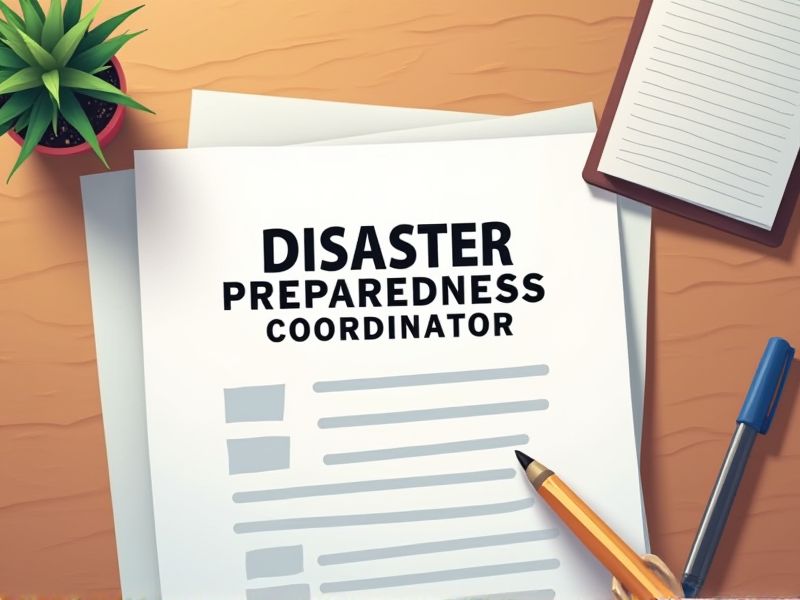
Disaster Preparedness Coordinators manage risks and facilitate quick responses during emergencies, necessitating a strong skill set in crisis management and strategic planning. Certifications validate a candidate's expertise, ensuring they're equipped to handle high-stakes situations effectively. They provide standardized knowledge crucial for effective communication and coordination among diverse emergency response teams. Important certifications can enhance your qualifications for a role as a Disaster Preparedness Coordinator.
Certified Emergency Manager (CEM)
A Certified Emergency Manager (CEM) ensures a Disaster Preparedness Coordinator possesses verified expertise in emergency management principles. This certification provides standardized practices, enhancing the coordinator's ability to effectively manage disaster scenarios. Having a CEM distinguishes the coordinator as knowledgeable and competent, which fosters trust and cooperation with stakeholders. The rigorous training and assessment associated with CEM equips the coordinator to optimize resource allocation during crises, improving overall response and recovery efforts.
Associate Emergency Manager (AEM)
An Associate Emergency Manager (AEM) possesses specialized knowledge critical for developing effective disaster preparedness plans, which enhances the overall resilience of communities. Their expertise in risk assessment allows them to identify potential hazards and implement proactive strategies to mitigate them. By coordinating with various agencies and stakeholders, AEMs ensure collaborative efforts that streamline resource allocation during emergencies. The presence of an AEM within a team can significantly improve response efficiency and reduce recovery time.
FEMA Emergency Management Institute (EMI) Certification
The FEMA Emergency Management Institute (EMI) Certification equips Disaster Preparedness Coordinators with standardized training that ensures consistent responses across various agencies. This certification delivers frameworks and techniques recognized nationally, which enhances coordination and communication during emergencies. Possessing an EMI certification increases a coordinator's credibility, indicating a mastery of vital emergency management concepts. This training offers specialized courses that prepare coordinators to anticipate, mitigate, and manage diverse disaster scenarios effectively.
National Incident Management System (NIMS) Certification
NIMS Certification provides Disaster Preparedness Coordinators with standardized protocols and procedures to manage incidents effectively. This certification enhances coordination and communication among diverse agencies during a disaster response, ensuring a unified approach. Training under NIMS helps coordinators streamline resource allocation and information flow, reducing chaos and confusion. Having NIMS Certification often fulfills federal and state requirements, making it essential for compliance in disaster preparedness roles.
Incident Command System (ICS) Certification
ICS Certification equips a Disaster Preparedness Coordinator with the standardized approach necessary for effective incident management. It ensures that they can communicate and collaborate efficiently with multiple agencies. The certification provides knowledge critical for structuring scalable responses, which is essential given the unpredictable nature of emergencies. By understanding ICS principles, coordinators can effectively allocate resources, thereby enhancing overall response efficiency.
Certified Business Continuity Professional (CBCP)
Certified Business Continuity Professionals possess the expertise to identify potential threats, ensuring the organization maintains operations during disruptions. Their training equips them with skills to create, implement, and evaluate robust disaster preparedness strategies. They facilitate effective communication between stakeholders, critical for timely decision-making in emergencies. Their certification provides assurance of their competence, increasing confidence in the recovery process during unforeseen events.
Disaster Recovery Institute Certification (DRI)
Organizations face various unforeseen challenges, and the Disaster Recovery Institute Certification (DRI) equips coordinators with standardized crisis management protocols, ensuring minimal business disruption. DRI certification provides comprehensive training in risk assessment and recovery planning, which enhances a coordinator's ability to develop effective preparedness strategies. Certified coordinators demonstrate a validated level of expertise, increasing stakeholder confidence in disaster recovery plans. Organizations often require DRI-certified professionals to meet compliance with industry standards and regulations, reinforcing resilience structures.
Certified Safety Professional (CSP)
Certified Safety Professionals possess specialized knowledge in risk assessment, essential for evaluating potential hazards in a disaster scenario. Their expertise in designing and implementing safety protocols strengthens the overall effectiveness of emergency response plans. Training in communication and leadership equips CSPs to coordinate with multiple agencies during crisis management. Holding a CSP credential often inspires greater trust and credibility, fostering cooperation and compliance from team members and stakeholders.
American Red Cross Emergency Preparedness Certification
Obtaining the American Red Cross Emergency Preparedness Certification equips a Disaster Preparedness Coordinator with essential skills and knowledge required to effectively manage emergency scenarios. This certification enhances credibility and trust among both team members and the community, ensuring cohesive disaster response efforts. The structured training provides insights into practical and strategic aspects of disaster preparedness, crucial for quick and informed decision-making. Certified coordinators are better prepared to educate and train communities, reducing vulnerability and increasing resilience against potential disasters.
Homeland Security Emergency Management Professional Certification
Homeland Security Emergency Management Professional Certification equips Disaster Preparedness Coordinators with standardized training and validated skills, enhancing their ability to manage emergencies effectively. Certification ensures coordinators are up-to-date with the latest practices and technologies, critical for fast-evolving disaster scenarios. Employers and agencies often require certification to verify a coordinator's competency and commitment to continuous professional development. Enhanced credibility during inter-agency cooperation fosters smoother operational collaboration.
Summary
With certifications, you can enhance your expertise and become a more effective Disaster Preparedness Coordinator. The additional knowledge equips you to implement more efficient and tailored response plans. Your authority in the field increases, leading to greater trust from both colleagues and the community. Certification can also improve career opportunities and potential for leadership roles in crisis management.
